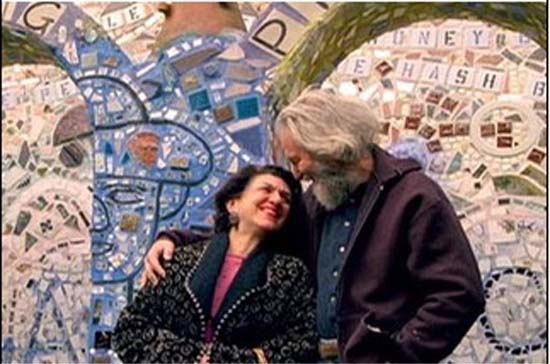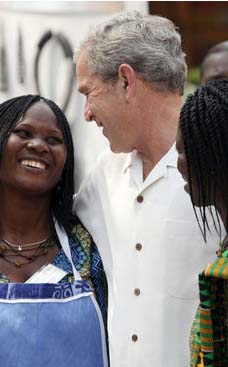
"My house was wild," says Jeremiah. "Sometimes there'd be art openings when he'd be naked and covered in mud and that got a little crazy. But he doesn't push his world onto you. He just lives there. I never felt any pressure to be what he is." Zagar Artist Isaiah Zagar served as a Peace Corps Volunteer in Peru in the 1960's.
In a Dream director Jeremiah Zagar discovers the private world of his mosaic artist father
Truth Be Tiled
In a Dream director Jeremiah Zagar discovers the private world of his mosaic artist father.
by Shaun Brady
Published: Apr 2, 2008
Caption: Julia and Isiah Zagar in "In aA Dream."
On the day that Jeremiah Zagar accompanied his parents, camera in hand, to pick up his older brother from rehab, he thought that what he was filming would be the coda to In a Dream, his documentary about his father, prolific Philly mosaic artist Isaiah Zagar. "I thought the movie would culminate with my brother and my father becoming friends again, and my brother being the savior of the family," says Jeremiah. "But that's just not what happened."
Instead, his father chose that day to reveal — on camera — to Jeremiah and then to Julia, his wife of nearly 40 years, that he'd been having an affair with his assistant. Suddenly Jeremiah's film became something entirely different. "The movie started out being about my father," he says, "and ended up being a love story about my mother and father and our family."
ADVERTISEMENT
When Jeremiah continues to film as his mother vents her rage in the front seat, to the point of nearly vomiting, he seems like the protagonist of those hard-to-believe first-person fictions, like Diary of the Dead and Cloverfield, where characters refuse to stop shooting even as their lives unravel before the lens. "There's a Diane Arbus quote," he says, "that if a tank was rolling at her and she had a camera in front of her face, she could let the tank roll right over her. It was sort of like that; if I took the camera away from my eye, I'd break down, but because I had the camera going, I was fine."
Once he finally did take the camera away, things did break down for a time. But once Jeremiah managed to resume the act of editing the film, he realized what a remarkable story he'd captured, and began to shoot again as his family slowly started to pick up the pieces. He says that his parents, who end the film in a tenuous rapprochement, are "stronger now than I've ever seen them. I think they tested it. They took it to the limit and came out of it saying, 'This is what we believe in. This is what we want.'"
That twist in the story, however, came after six years of filming, during which Jeremiah captured his father's confessions of childhood molestation, a nervous breakdown and suicide attempt, and most of all, the way his family's story had been immortalized on brightly colored, mirrored walls all over Philly via Isaiah's art.
It was at an early viewing of Terry Gilliam's The Adventures of Baron Munchausen with his father that Jeremiah fell in love with filmmaking. Initially, the film was a consolation choice, when Isaiah wouldn't allow his son to see Terminator 2. But they ended up sitting through Munchausen for three straight screenings. Though Jeremiah didn't make the explicit connection, it's impossible not to relate that story of an inveterate dreamer with the one sitting next to young Jeremiah in the theater. But unlike Munchausen, Isaiah kept his private world largely to himself.
"My house was wild," says Jeremiah. "Sometimes there'd be art openings when he'd be naked and covered in mud and that got a little crazy. But he doesn't push his world onto you. He just lives there. I never felt any pressure to be what he is."
Jeremiah was 19 and had just completed a documentary called Delhi House, about an orphanage and clinic in India, when his mother suggested the idea of filming his father. "I didn't want to," Jeremiah admits. "Everybody does films on their father when they're 19. But I started shooting, not knowing what the film would be. I just started asking questions. And mostly it was really bad."
That early footage, with his father awkward and evasive on camera, survives in only one scene in the finished film, when Isaiah hints at but refuses to elaborate on his attempted suicide at the age of 29. Later that year, the two went to the family's summer home in West Virginia together, where Isaiah began to relax and reveal. "When he was away from his world, and away from the escape of being in Philadelphia, he just opened up," Jeremiah recalls. "It was really intense. We were supposed to spend a week and a half down there, but after shooting for five days he was like, 'That's it.'"
While he had some idea of his dad's past, the experience of interposing a camera changed the father-son dynamic, Jeremiah says. "He was a great dad, but he was very isolated in his own world, this crazy, tile mosaic world. He would retreat from it to be part of our family, but when he was there, he was there. I think the camera allowed me to be there with him."








